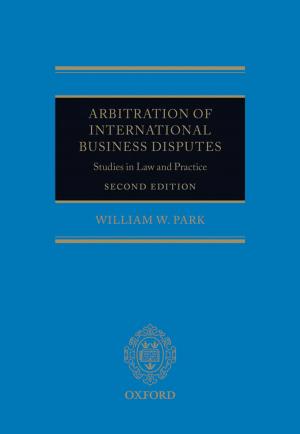| Author: | Nicholas J. J. Smith | ISBN: | 9780191607929 |
| Publisher: | OUP Oxford | Publication: | November 6, 2008 |
| Imprint: | OUP Oxford | Language: | English |
| Author: | Nicholas J. J. Smith |
| ISBN: | 9780191607929 |
| Publisher: | OUP Oxford |
| Publication: | November 6, 2008 |
| Imprint: | OUP Oxford |
| Language: | English |
In Vagueness and Degrees of Truth, Nicholas Smith develops a new theory of vagueness: fuzzy plurivaluationism. A predicate is said to be vague if there is no sharply defined boundary between the things to which it applies and the things to which it does not apply. For example, 'heavy' is vague in a way that 'weighs over 20 kilograms' is not. A great many predicates - both in everyday talk, and in a wide array of theoretical vocabularies, from law to psychology to engineering - are vague. Smith argues, on the basis of a detailed account of the defining features of vagueness, that an accurate theory of vagueness must involve the idea that truth comes in degrees. The core idea of degrees of truth is that while some sentences are true and some are false, others possess intermediate truth values: they are truer than the false sentences, but not as true as the true ones. Degree-theoretic treatments of vagueness have been proposed in the past, but all have encountered significant objections. In light of these, Smith develops a new type of degree theory. Its innovations include a definition of logical consequence that allows the derivation of a classical consequence relation from the degree-theoretic semantics, a unified account of degrees of truth and subjective probabilities, and the incorporation of semantic indeterminacy - the view that vague statements need not have unique meanings - into the degree-theoretic framework. As well as being essential reading for those working on vagueness, Smith's book provides an excellent entry-point for newcomers to the era - both from elsewhere in philosophy, and from computer science, logic and engineering. It contains a thorough introduction to existing theories of vagueness and to the requisite logical background.
In Vagueness and Degrees of Truth, Nicholas Smith develops a new theory of vagueness: fuzzy plurivaluationism. A predicate is said to be vague if there is no sharply defined boundary between the things to which it applies and the things to which it does not apply. For example, 'heavy' is vague in a way that 'weighs over 20 kilograms' is not. A great many predicates - both in everyday talk, and in a wide array of theoretical vocabularies, from law to psychology to engineering - are vague. Smith argues, on the basis of a detailed account of the defining features of vagueness, that an accurate theory of vagueness must involve the idea that truth comes in degrees. The core idea of degrees of truth is that while some sentences are true and some are false, others possess intermediate truth values: they are truer than the false sentences, but not as true as the true ones. Degree-theoretic treatments of vagueness have been proposed in the past, but all have encountered significant objections. In light of these, Smith develops a new type of degree theory. Its innovations include a definition of logical consequence that allows the derivation of a classical consequence relation from the degree-theoretic semantics, a unified account of degrees of truth and subjective probabilities, and the incorporation of semantic indeterminacy - the view that vague statements need not have unique meanings - into the degree-theoretic framework. As well as being essential reading for those working on vagueness, Smith's book provides an excellent entry-point for newcomers to the era - both from elsewhere in philosophy, and from computer science, logic and engineering. It contains a thorough introduction to existing theories of vagueness and to the requisite logical background.















